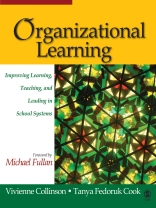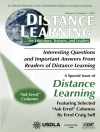Reshapes the way teachers and administrators think about people, practices, and policies…
This innovative book about organizational learning in K–12 settings reshapes the way teachers and administrators think about people, practices, and policies while providing a compelling roadmap for transformation from within today′s school systems.
Key Features:
- Six interrelated conditions support organizational learning: prioritizing learning, fostering inquiry, facilitating the dissemination of knowledge, practicing democratic principles, attending to human relationships, and providing for members′ self-fulfillment.
- An on-going case study connects everyday practices in school systems to a holistic framework that helps practitioners understand how their thinking and behaviors influence learning, work environments, collegial interactions, decision making, and innovation.
- Numerous practical examples bring complex theoretical concepts to life, while a series of essential questions, activities for getting started, and reflective journal prompts allow practitioners to apply content and ideas to their own settings
قائمة المحتويات
List of Tables, Figures and Illustrations
Foreword
Preface
Acknowledgments
Part I: What Is Organizational Learning?
Chapter 1: New Ways of Thinking: New Ways of Learning
Moving from an Industrial to a Knowledge Society
Theory and Practice
A Working Definition of Organizational Learning
Case Study
Looking Ahead
Reflective Journal
Chapter 2: Organizational Learning: Original Sources and Perspectives
Why Start With Theory?
How Will Understanding Theory Help an Organization Learn?
Origins of Perspectives on Organizational Learning
Example of Single-Loop Learning
Example of Double-Loop Learning
Example of a Discovering Organization
Comparison of Organizational Adaptation and Organizational Learning
Example of Superstitious Learning
An Application of Organizational Learning Concepts
Example of Organizational Learning by Math Teachers
Reflective Journal
Chapter 3: Core Assumptions of Organizational Learning Perspectives
Core Assumptions
Example of Multilevel Learning
Example of Building Shared Understandings
Example of Embedding Knowledge
A Framework for Understanding and Practicing Organizational Learning
An Example of the Unbelievable
Act-Then-Think
Example of How Language Frames Issues
Reflective Journal
Part II: Why Is Organizational Learning Important For Schools and School Systems?
Chapter 4: Ensuring a Cycle of Continuous Learning
From Individual to Organizational Learning
From Insights to Institutionalized Learning
The Apple Story: Illustrating Four Learning Processes
Example of Learning Processes in a Middle School
Feed Forward and Feedback
Example of Learning Processes: Change in Routines
A Cyclical Process of Learning
Example of Error Detection as a Source of Learning
Reflective Journal
Chapter 5: Organizational Learning as Renewal
Renewal for Sustainability
Deutero Learning
Example of an Organizational Defensive Routine
Defensive Routines in School Contexts
Defensive Routines in Context
From Theory to Practice
Reflective Journal
Part III: How Do Schools and School Systems Foster Organizational Learning?
Chapter 6: Prioritizing Learning for All Members: The Primary Condition
Why is Prioritizing Learning Important?
Learning Case Study
Learning: A Way of Thinking
Changing Thinking, Changing Vocabulary
Learning: The Primary Condition
Example of Openness to Error Detection
Essential Questions
Getting Started Activities/Ideas
Further Reading
Reflective Journal
Chapter 7: Fostering Inquiry and Its Collateral Learning
Why is Inquiry Important for Organizational Learning?
Inquiry: A Specific Kind of Learning
Inquiry Case Study
Inquiry: A Way of Thinking
Inquiry and Attitudes
Inquiry and Attitudes: A Reciprocal Process
Direct Inquiry
Example of Collective Inquiry and Openness to New Ideas
Example of Inquiry as Continuous Improvement
Indirect Inquiry
Essential Questions
Getting Started Activities and Ideas
Further Reading
Reflective Journal
Chapter 8: Facilitating the Dissemination of Learning
Why is Dissemination Important for Organizational Learning?
Dissemination Case Study
Dissemination: A Way of Thinking
Dissemination: Sharing Learning
Examples of Dissemination as Dialogue
Example of a Mismatch Affecting Dissemination
Essential Questions
Getting Started Activities and Ideas
Further Reading
Reflective Journal
Chapter 9: Practicing Democratic Principles
Why are Democratic Principles Important for Organizational Learning?
Democratic Principles Case Study
Democratic Principles: A Way of Thinking
Democratic Principles: A Way of Living
Open Systems and Democratic Principles
A Contradiction: Democratic Life and the Bureaucratic Model
Example of a Minority as a Catalyst for Good
Roles and Responsibilities in Democratic Organizations
Example of Dependency and Low Responsibility
Summary: Leader as Model
Example of Linkages Between Learning and Professional Control
Democratic Principles and Organizational Learning
Long-Term Threats to Democratic Principles in Organizations
Summary of Threats to Democratic Principles
Essential Questions
Getting Started Activities and Ideas
Further Reading
Reflective Journal
Chapter 10: Attending to Human Relationships
Why are Human Relationships Important?
Human Relationships Case Study
Human Relationships: A Way of Thinking
Human Relationships: A Social Infrastructure
Schools With Strong Relational Trust
Potential Outcomes of Independence and Interdependence
Example of Conflict as Learning
Essential Questions
Getting Started Activities and Ideas
Further Reading
Reflective Journal
Chapter 11: Providing for Members? Self-Fulfillment
Why is Providing for Members? Self-Fulfillment Important?
Members′ Self-Fulfillment Case Study
Providing for Members? Self-Fulfillment: A Way of Thinking
Historical Communities of Learners
Nurturing Members? Quest for Meaningful Values and Goals
Values and Practices of High-Performing Teachers/Leaders
Ways to Solicit Knowledge From All Members
Example of Goverment Influence on Innovation
Nurturing Members? Commitment and Connections
Providing Opportunities to Communicate and Connect
Nurturing Members? Aspirations for Growth
Hiring to Enhance Renewal
Essential Questions
Getting Started Activities and Ideas
Further Reading
Reflective Journal
Part IV: Looking Back, Looking Ahead
Chapter 12: Organizational Learning: A Balancing Act
Creating a Culture That Rewards Learning
The Role of Feedback and Feed Forward for Learning
Example of Influences Affecting Accuracy of Interpretations
Ways to Encourage Argument and Feedback
Organizational Memory: A Double-Edged Sword
Organizational Learning: Improving Learning, Teaching, and Leading
Organization Development: Building Schools′
Capacity to Develop and Extend Organizational Learning
Chapter 13: How Research Can Help Schools and Systems Move Forward
Examining Assumptions
Questions for Researchers and Practitioners
Wanting to Learn
Attending to All Members? Growth
Pinehurst Revisited: Practitioners Modeling Research for and With Students
Glossary
References
Index
About the Authors












